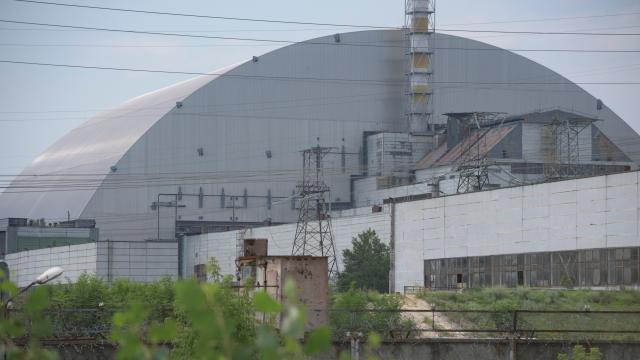The former nuclear power plant at Chernobyl is now experiencing a power outage amid Russia’s ongoing invasion of Ukraine, prompting concerns of “nuclear discharge.” Experts say the hazard risk is low and that pending power issues at functioning reactors are the real concern.
A “high-voltage line is currently disconnected due to the damage caused by the occupiers,” says a March 9 tweet from State Special Communications Service of Ukraine. “As a result, the Chernobyl station and all nuclear facilities in the Exclusion Zone are without electricity.”
The Ukrainian state communications service said power is needed to cool the roughly 20,000 spent fuel rods with circulating water, which is “possible only if there is electricity.” Without power, the temperature of the holding pools will increase, causing the water to evaporate. That would “lead to nuclear discharge” and a radioactive cloud that could drift to “other regions of Ukraine, Belarus, Russia and Europe,” warned SSSCIP Ukraine.
“Ukraine is doing everything possible to shortly restore electricity supply,” German Galushchenko, Ukraine’s minister of energy, said in a government statement. Galushchenko said general electricity to the plant is provided by several power lines, which were “interrupted” by shelling from Russian forces. The plant is currently being run on backup power in the form of diesel generators, he added. The Guardian reports that Ukraine’s national power company Ukrenergo cannot restore the power lines owing to the fighting in the area.
In 1986, the Chernobyl plant experienced the worst nuclear disaster in history. The plant is no longer functioning, as the reactors have been shut down, but the facility requires constant management of the spent radioactive fuel kept at the site.
Speaking to me by phone, Gregory Jaczko, a physicist and former chairman of the U.S. Nuclear Regulatory Commission, described the threat at Chernobyl as being “relatively low.” He said the loss of power is not of immediate concern as the cooling pool is very large and the spent fuel is very old. The boiling off of the water would take “significant time,” Jaczko explained, perhaps “many, many weeks,” and the potential for contamination and the release of radiation remains low.
Claire Corkhill, a nuclear expert from the University of Sheffield, said any release of vapour would likely stay contained within the facility. “I don’t think this would lead to a release of radioactivity because it would take a very long time for the water to eventually evaporate,” she told the BBC. “The spent fuel is kept in a modern building which should be sealed and have structural integrity.”
The International Atomic Energy Agency (IAEA) likewise agrees that, while not ideal, the current situation at Chernobyl is not particularly dangerous. The “volume of cooling water in the pool is sufficient to maintain effective heat removal from the spent fuel without a supply of electricity,” the IAEA said in a March 9 statement, adding that the plant “has reserve emergency power supplies with diesel generators and batteries.”
That said, the current situation, with the plant being under Russian control, is not how the plant should be operated, Jaczko said, as it “needs to be maintained properly and not by an invading army.” Russian forces seized the plant shortly after launching their invasion of Ukraine on February 24. More than 100 workers at the plant, along with some 200 Ukrainian guards, are not allowed to leave the facility, and it remains surrounded by Russian tanks and soldiers. The workers are having to sleep on tables and the floor and are subsisting on bread and porridge, the BBC reports. The daughter of one of the workers says at least one managed to escape by fleeing into the exclusionary zone.
These issues notwithstanding, Jaczko’s real concern has to do with nuclear power plants in Ukraine with reactors currently in operation. These plants rely on the electrical power grid to provide safety functions, and if shut down they have the “potential for more significant releases” of radiation, he said.
In related news, the IAEA — the UN’s nuclear watchdog — says it has lost track of the remote data transmission from the plant’s safeguard system, which monitors nuclear material kept at the site. As a result, the IAEA is not currently able to monitor nuclear material and activities at the facility. Jaczko said he isn’t particularly concerned about this latest development.
“There is very little concern that Russian forces are attempting to steal radioactive sources, as Russia has its own capabilities to procure these materials — they don’t need to steal this material from Ukraine,” he said. Jaczko said it’s also unlikely that third party actors are trying to steal this material, as there’s a “shooting war” going on, and that “spent fuel cannot be moved without very sophisticated machinery or equipment.” The loss of communication, he said, is “more the result of war.”
The situation in Ukraine continues to unfold, and there’s no certainty that the ongoing war won’t cause damage to existing power plants or result in calamitous power outages. As Russia continues along its very dangerous path, the risks of conventional 21st century warfare become frighteningly more apparent.
Editor’s Note: Release dates within this article are based in the U.S., but will be updated with local Australian dates as soon as we know more.
